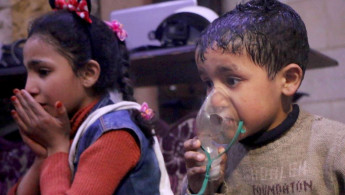Hundreds treated in Syria's Douma after 'chemical weapons attack'
A chemical weapons attack that took place in the Syrian rebel-held town of Douma has been condemned by the World Health Organisation, which said around 500 patients attended health facilities with "signs and symptoms consistent with exposure to toxic chemicals".
"WHO demands immediate unhindered access to the area to provide care to those affected, to assess the health impacts, and to deliver a comprehensive public health response," said Peter Salama, WHO deputy director-general for emergency preparedness and response, said in a statement issued in Geneva.
Douma, in the Damascus suburb of Eastern Ghouta, was apparently attacked with chemical weapons that killed as many as 60 people and injured more than 1,000 people.
The Organisation for the Prohibition of Chemical Weapons said in a statement on Tuesday its inspectors were "preparing to deploy to Syria shortly," though it did not give a more precise timetable on when the inspectors would arrive.
"This has coincided with a request from the Syrian Arab Republic and the Russian Federation to investigate the allegations of chemical weapons use in Douma," the statement said.
The OPCW said its technical Secretariat has asked the Syrian regime to make the necessary arrangements for the deployment, which will determine whether banned munitions were used - but will not assign blame.
The Assad regime and the Kremlin both deny responsibility of the chemical attack and have questioned whether the attack even happened, despite footage from Douma with strong evidence suggesting a chemical attack.
The Syrian conflict began when the Baath regime, in power since 1963 and led by President Bashar al-Assad, responded with military force to peaceful protests demanding democratic reforms during the Arab Spring wave of uprisings, triggering an armed rebellion fuelled by mass defections from the Syrian army.
According to independent monitors, hundreds of thousands of civilians have been killed in the war, mostly by the regime and its powerful allies, and millions have been displaced both inside and outside of Syria. The brutal tactics pursued mainly by the regime, which have included the use of chemical weapons, sieges, mass executions and torture against civilians have led to war crimes investigations.





 Follow the Middle East's top stories in English at The New Arab on Google News
Follow the Middle East's top stories in English at The New Arab on Google News
![Israeli forces ordered bombed Gaza's Jabalia, ordering residents to leave [Getty]](/sites/default/files/styles/image_330x185/public/2176418030.jpeg?h=a5f2f23a&itok=_YGZaP1z)

